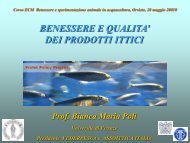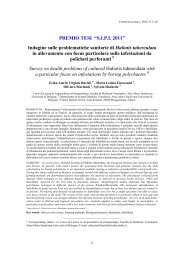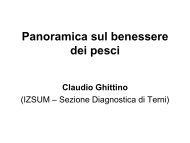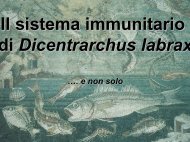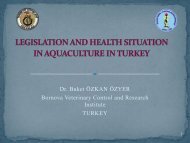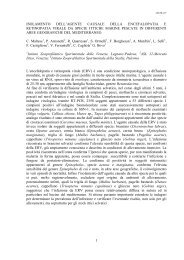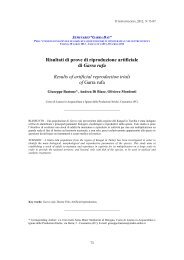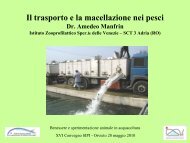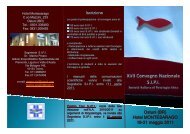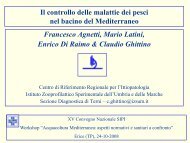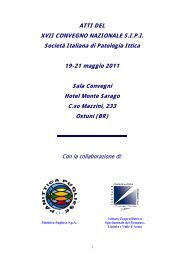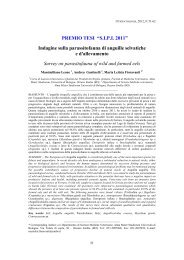ATTI DEL XV CONVEGNO NAZIONALE SIPI Società Italiana di ...
ATTI DEL XV CONVEGNO NAZIONALE SIPI Società Italiana di ...
ATTI DEL XV CONVEGNO NAZIONALE SIPI Società Italiana di ...
- No tags were found...
Create successful ePaper yourself
Turn your PDF publications into a flip-book with our unique Google optimized e-Paper software.
Abstract Workshop<br />
impressive yields of both e<strong>di</strong>ble and ornamental fish have been obtained by some 15 farms.<br />
Desert aquaculture and agri-aquaculture take advantage of:<br />
• Large quantities of brackish ground water, only partially suitable to agriculture<br />
• Warm ambient climate<br />
• Long hours of sunshine<br />
• Geothermal bores that with greenhouse use maintain high temperature in the winter<br />
• Dry climate that allows water cooling in the summer<br />
• Cheap land<br />
• Year-round production• Minimal ecological risks<br />
• Geographic isolation: natural quarantine<br />
In ad<strong>di</strong>tion, the desert in Israel has become a fertile ground for innovative aquaculture<br />
industries. One such enterprise is located at Kibbutz Ketura in the heart of the Arava<br />
desert. The crop being grown there is Haematococcus pluvialis, a microalga which is very<br />
rich in astaxanthin. This carotenoid is not only an important part of the <strong>di</strong>et of salmon and<br />
crustaceans, endowing them with their characteristic bright pink hue, but is also a powerful<br />
anti-oxidant increasingly recognized for its <strong>di</strong>sease-fighting properties. Israel is now the<br />
world's lea<strong>di</strong>ng supplier of natural astaxanthin for human consumption. The Kibbutz<br />
Ketura facility, run by Algatechnologies Ltd. (Algatech), was established in 1998 based on<br />
the scientific research of Prof. Sammy Boussiba of Ben-Gurion University of the Negev,<br />
and has been producing astaxanthin in commercial quantities since 2003.<br />
In the city of Ashkelon on the Me<strong>di</strong>terranean coast of Israel, the Seambiotic Company,<br />
established in 2003, utilizes carbon <strong>di</strong>oxide emissions from a coal burning power plant for<br />
cultivation of a marine <strong>di</strong>atom (Skeletonema costatum) containing a high percentage of<br />
lipids and carbohydrates which can be processed into bio-fuels. Algae biofuels are nontoxic,<br />
contain no sulfur, and are highly biodegradable. This technology uses existing<br />
resources (sea water and solar energy) without harming agriculture (such as corn or sugar<br />
cane) as a source of food, is applicable on arid land, and is a great step towards the<br />
reduction of air pollution and global warming. Also, integrated agri-aquaculture systems<br />
were refined and made more efficient. Recycled water, rich in fertilizing organic waste<br />
produced by the fish, has been used to irrigate olive and date palm groves or grow<br />
greenhouse produce in what was considered terrible soil. "Desert" cherry tomatoes,<br />
peppers, asparagus, and melon are regularly exported to Europe, especially during winter.<br />
The flourishing of agriculture in the country's semi-arid and hyper-arid regions is largely<br />
the result of a concentrated investment in research related to salt and drought-resistant<br />
plant species, green/hot house technologies and aquaculture. Although Israel's agricultural<br />
production has expanded sixteen-fold in the last 60 years, thanks to Israel's advanced<br />
irrigation technology and water management, water usage <strong>di</strong>d not increase. By the year<br />
2020 Israel's population is expected to grow to 8.5 million. This will cause huge increases<br />
in demand for agricultural produce. Urban use of land and water will also increase<br />
enormously. The amount of fresh water allocated for agriculture was reduced ra<strong>di</strong>cally, by<br />
50% (to 580 million cubic meters) in 2000, following a severe drought. By 2020 it is<br />
unlikely to exceed this amount, and - in particular for freshwater aquaculture - may well be<br />
considerably less. The future <strong>di</strong>rection and success of Israeli farming will depend on water<br />
availability, on the ability to further minimize water use, and on the ability to use more<br />
saline water and/or recycled wastewater and less potable water.<br />
74



